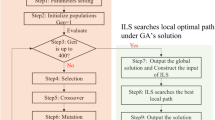Abstract
To study the flexible job-shop problem(FJSP) with considering the transporting time and deteriorating effect, a novel model with the objective of minimizing the makespan is developed by disjunction graph and a linear deteriorating function whereas a hybrid algorithm (IGAVNS) is proposed combining immune genetic algorithm (IGA) with variable neighborhood search strategy (VNS). First, the operation-based encoding method is used to encode chromosome individual, solving the operation sequencing and machine selection. Then, elite individual is searched by the proposed algorithm with five neighborhood structures. Simulations were carried out by different algorithms on the cases of different sizes. The results were compared and analyzed, verifying the effectiveness of the proposed algorithm.
Access this chapter
Tax calculation will be finalised at checkout
Purchases are for personal use only
Similar content being viewed by others
References
Kacem I, Hammadi S, Borne P (2002) Approach by localization and multiobjective evolutionary optimization for flexible job-shop scheduling problems. IEEE Trans Syst Man Cybern Part C (Appl Rev) 32(1):1–13
Pezzella F, Morganti G, Ciaschetti G (2008) A genetic algorithm for the flexible job-shop scheduling problem. Comput Oper Res 35(10):3202–3212
Xing LN, Chen YW, Wang P et al (2010) A knowledge-based ant colony optimization for flexible job shop scheduling problems. Appl Soft Comput 10(3):888–896
Jia Z, Chen H, Tang J (2007) A new multi-objective fully-informed particle swarm algorithm for flexible job-shop scheduling problems. In: International conference on computational intelligence & security workshops. IEEE
Zhang GH et al (2019) Solving flexible job shop scheduling problems with transportation time based on improved genetic algorithm. Math Biosci Eng: MBE 16:1334–1347
Ji M, Fang J, Zhang W et al (2018) Logistics scheduling to minimize the sum of total weighted inventory cost and transport cost. Comput Ind Eng 120:206–215
Hurink J, Knust S (2005) Tabu search algorithms for job-shop problems with a single transport robot. Eur J Oper Res 162(1):99–111
Gupta JND, Gupta SK (1988) Single facility scheduling with nonlinear processing times. Comput Ind Eng 14(4):387–393
Wu HP, Huang M (2014) Improved estimation of distribution algorithm for the problem of single-machine scheduling with deteriorating jobs and different due dates. Comput Appl Math 33(3):557–573
Mosheiov G (1994) Scheduling jobs under simple linear deterioration. Elsevier Science Ltd.
Wu CC, Wu WH, Wu WH et al (2014) A single-machine scheduling with a truncated linear deterioration and ready times. Inf Sci 256:109–125
Cheng M, Tadikamalla PR, Shang J et al (2014) Bicriteria hierarchical optimization of two-machine flow shop scheduling problem with time-dependent deteriorating jobs. Eur J Oper Res 234(3):650–657
Wang JB, Wang MZ (2013) Solution algorithms for the total weighted completion time minimization flow shop scheduling with decreasing linear deterioration. Int J Adv Manuf Technol 67(1–4):243–253
Liu CH, Chen LS, Lin PS (2013) Lot streaming multiple jobs with values exponentially deteriorating over time in a job-shop environment. Int J Prod Res 51(1):202–214
Mosheiov G (2002) Complexity analysis of job-shop scheduling with deteriorating jobs. Discrete Appl Math 117(1–3):195–209
Tayebi Araghi ME, Jolai F, Rabiee M (2014) Incorporating learning effect and deterioration for solving a SDST flexible job-shop scheduling problem with a hybrid meta-heuristic approach. Int J Comput Integr Manuf 27(8):733–746
Wang L (2003) Shop scheduling with genetic algorithms. Tsinghua University Press, Beijing (in Chinese)
Xu X, Wang W, Guan Q (2005) Adaptive immune algorithm for solving job-shop scheduling problem. In: International conference on natural computation. Springer, Heidelberg
Author information
Authors and Affiliations
Corresponding author
Editor information
Editors and Affiliations
Rights and permissions
Copyright information
© 2020 Springer Nature Singapore Pte Ltd.
About this paper
Cite this paper
Huang, Z., Yang, J. (2020). A Hybrid Approach for Solving the Flexible Job-Shop Scheduling Problem with Considering Transporting Time and Deteriorating Effect. In: Jia, Y., Du, J., Zhang, W. (eds) Proceedings of 2019 Chinese Intelligent Systems Conference. CISC 2019. Lecture Notes in Electrical Engineering, vol 593. Springer, Singapore. https://doi.org/10.1007/978-981-32-9686-2_35
Download citation
DOI: https://doi.org/10.1007/978-981-32-9686-2_35
Published:
Publisher Name: Springer, Singapore
Print ISBN: 978-981-32-9685-5
Online ISBN: 978-981-32-9686-2
eBook Packages: Intelligent Technologies and RoboticsIntelligent Technologies and Robotics (R0)




